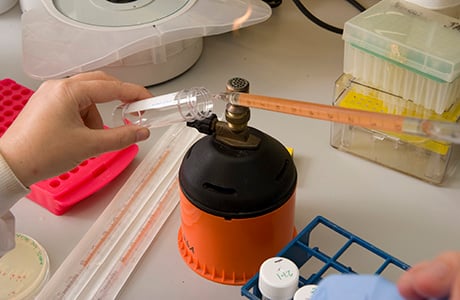
Biochemistry (Molecular and Cellular)
Course overview
UCAS code: C700
Entrance requirements: A*AA including Chemistry and another science or Maths, with the A* in Maths, Physics, Chemistry, or Biology (or a very closely related subject).
Course duration: 4 years (MBiochem)
Subject requirements
Required subjects: Chemistry and another science or Maths
Recommended subjects: Maths
Helpful subjects: Biology (beyond GCSE)
Other course requirements
Admissions tests: None
Written Work: None
Admissions statistics*
Interviewed: 41%
Successful: 12%
Intake: 100
*3-year average 2022-24
Contact
Email: admissions@bioch.ox.ac.uk
Unistats information for this course can be found at the bottom of the page
Please note that there may be no data available if the number of course participants is very small.
About the course
Biochemistry is the use of molecular methods to investigate, explain and manipulate biological processes.
The study of life at the molecular level continues to undergo dynamic expansion, leading to ever-increasing insights into topics as various as the origin of life, the nature of disease and the development of individual organisms.
Powerful new techniques, such as those of genome editing, super-resolution microscopy and CryoEM, enable us to analyse biological phenomena in more and more precise molecular terms.
These studies have led to extraordinary developments in our understanding of the molecular basis of life itself. We can also apply this new knowledge in an ever increasing variety of ways enabling rational drug design and synthesis, synthetic biology, environmental monitoring and a whole range of other areas. Furthermore, advances in biochemistry are largely responsible for the breakdown of traditional disciplinary boundaries between cell biology, medicine, physics and chemistry.
The Biochemistry Department at Oxford is one of the largest in Europe, and is subdivided into the following research areas:
- Cell biology, development and genetics
- Chromosomal and RNA biology
- Infection and disease processes
- Microbiology and systems biology
- Structural biology and molecular biophysics.
The department is highly active in research, with about 450 postgraduate students and research staff. The breadth and excellence of these activities are reflected in the scope of the undergraduate course and underpin the teaching.
The department has superb research, modern teaching facilities and excellent digital resources, which we use in an integrated way to teach.
Research placements
An important aspect of the Oxford Biochemistry course is its fourth-year project, which occupies most of the 4th year.
The fourth year project provides an opportunity to pursue an in-depth research project under the supervision of an academic member of staff. You choose a project together, plan your research programme, design your experiments and present your results to other researchers in the field. The experience gained is much valued by employers.
We find that many of our students are inspired to pursue a research career as a result of their project year.
A wide choice of fourth-year research projects is available both within the Biochemistry Department and in related departments throughout the university. These range from Physics, Statistics and Biology through to Clinical Medicine, Pharmacology and Pathology. This reflects the interdisciplinary nature of the subject.
It is also possible to carry out a self-organised project outside the University or the UK.
 |  | |
'The broad knowledge of biochemistry that I learned has been invaluable as a starting point for learning the more specialist clinical biochemistry that is part of my current training. I learned a lot about being able to work independently and to proactively seek knowledge and opportunities, which is critical when training in a busy hospital department. I also feel lucky to have completed an undergraduate degree with a master’s year included - this has given me invaluable skills in and understanding of research, which is incredibly useful when approaching research in my current role.' Rebecca | 'I really like the way that Oxford teaches. It is very different from other universities where you pick options a lot sooner. The course allows you to see what’s out there and really lays the foundation work that is absolutely needed if you want to go into science careers when you finish. I also like the project in the fourth year. I’m really looking forward to it as I’ll get the chance to work for an extended amount of time in a lab. It will definitely help me to decide whether a job in research/PhD is for me!' Jemma |
Unistats information
Discover Uni course data provides applicants with Unistats statistics about undergraduate life at Oxford for a particular undergraduate course.
Visit the Studying at Oxford section of this page for a more general insight into what studying here is likely to be like.
Please select 'see course data' to view the full Unistats data for Biochemistry.
Please note that there may be no data available if the number of course participants is very small.
Biochemistry (Molecular and Cellular)
A typical week (Year 1)
During year 1, your weekly timetable will be divided between lectures (typically eight to ten a week), tutorials and classes (1 to 3 a week) and practicals (up to one full day a week). The remaining time will be spent on independent study and preparation for tutorials and classes.
Tutorials are usually 2-4 students and a tutor working through a topic together. For some topics classes are offered; class sizes may vary depending on the topic but are usually no more than 10-12 students. During practical sessions there is usually a ratio of demonstrators to students of about 1:12 for wet practicals and up to 1:25 for computer based practicals.
Most tutorials and lectures are delivered by academic staff, many of whom are world-leading experts with years of experience in teaching and research.
Some tutorials and lectures may be delivered by postdoctoral researchers, while tutorials are occasionally delivered by postgraduate students.
Departmental classes and practicals are supervised by a senior member of staff and supported by postdoctoral researchers or postgraduate students who are studying at doctoral level.
At the end of the first year you will sit exams, called prelims, one exam in each of the subjects covered. You are required to pass these to progress onto year 2, with the opportunity to resit over the summer.
Years 2-3
In the 2nd and 3rd year you continue to be taught in lectures, practicals and tutorials. However, the course is organised into immersive blocks where all the teaching in a particular week is focussed on exploring a specific biochemical question.
A typical block would have up to 8 lectures and some form of practical or data analysis activity.
Year 4
In your fourth year, you will choose and complete a project, lasting most of the year, which will allow you to explore in detail, both laboratory-based research and specific recent advances in biochemistry. This is supported by a skills training programme, which includes skills like communication and career planning.
Under the supervision of a research group leader, you will design your own experiments, learn to plan research programmes and present your results and ideas – orally and in written form – to other workers in the field. The research project is written up in a dissertation. A number of student projects form part of research publications from the university.
Apart from the project, you will have the task of writing a review article, covering current research in an area of biochemical interest.
You will need to be in Oxford for a 12 week extended first term. You will continue your project over the entire second term and first few weeks of the third term, submitting your project dissertation thereafter. You will also deliver an oral presentation on your project.
Assessment and final degree award
The final degree class is derived from a combination of marks from assessments taken in the second and third years, the final exams at the end of year 3, the assessment of the research project and the review article in the fourth year.
The significant research element in your final year means that you will graduate with an MBiochem – an integrated master's degree – as well as invaluable research experience and skills that will be excellent preparation for further study or a range of careers.
To find out more about how our teaching year is structured, visit our Academic Year page.
Course structure
Year 1
Courses | Assessment |
|---|---|
Five courses are taken:
| First University examinations: five written papers; satisfactory practical record |
Years 2 and 3
Courses | Assessment |
|---|---|
Teaching delivered in one week blocks, each sitting within one of five threads:
| Summative assessments (four, two-hour assessments in years 2 and 3). |
Year 4 (including extended first term)
Courses | Assessment |
|---|---|
| Research project: Written dissertation and an oral presentation. Review article: Written review article. |
The content and format of this course may change in some circumstances. Read further information about potential course changes.
Academic requirements
Qualification | Requirement |
|---|---|
A-levels: | A*AA including Chemistry and another Science or Mathematics. The A* must be in Mathematics, Physics, Chemistry or Biology, or a very closely related subject |
Advanced Highers: | For those taking three Advanced Highers, AAB including an A in Chemistry and an A or B in another science or Mathematics, or for those doing two Advanced Highers and one Higher, AAA, including A in AH Chemistry and A in another Science or Mathematics at AH or H level. |
International Baccalaureate (IB): | 39 (including core points) with 7 in HL Chemistry and 6 in two other relevant subjects at HL or SL |
Any other equivalent qualification: | View information on other UK qualifications, and international qualifications |
Wherever possible, your grades are considered in the context in which they have been achieved.
Read further information on how we use contextual data.
Subject requirements
Essential: | Chemistry to A-level, Advanced Higher, Higher Level in the IB or any other equivalent, plus another science or Mathematics. |
|---|---|
Recommended: | Mathematics to A-level or the equivalent is recommended to students in completing the course and, although not required for admission, may make an application more competitive. |
Helpful: | Biology beyond GCSE or the equivalent (eg AS-level, Scottish Highers, Standard Level in the IB) can be helpful to students in completing the course, although is not required for admission. More detailed information is available on the department website. |
If a practical component forms part of any of your science A‐levels used to meet your offer, we expect you to pass it.
If English is not your first language you may also need to meet our English language requirements.
Applying
All candidates must follow the application procedure as shown on our Applying to Oxford pages.
The following information gives specific details for students applying for this course.
Written work and admissions tests
You do not need to take a written test or submit any written work as part of an application for this course.
What are tutors looking for?
As biochemistry is not taught as an A-level subject, tutors will not expect you to have a detailed knowledge of the subject. However, if you are shortlisted for interview, tutors will be looking for an informed interest in the subject (originating from podcasts, videos, books, magazine articles etc). They will also be looking for an ability to use information (from other school or college science subjects) to analyse and solve problems and to construct your own opinions.
Visit the Biochemistry website for more detail on the selection criteria for this course.
Careers
Biochemistry covers a range of scientific disciplines, including cell biology, genetics, microbiology, biophysics and biomedical sciences. Because of its breadth, there are a wide range of employment opportunities available post degree. These can include opportunities in education, law, finance, data science and publishing alongside roles in the biotechnology and pharmaceutical sector and academic research.
Typically about 60% of our biochemistry graduates go on to do research or further study, mostly in biochemistry related subjects.
Further details of careers in biochemistry can be found on the UK Biochemical Society website.
James, a graduate of the course who now works in science communication says:
'The Oxford biochemistry course gave me not only a thorough grounding in a range of specific biochemistry topics, but also a deep understanding about the practical processes of scientific research in general. My work in science communication and engagement has all stemmed from the experiences and opportunities I gained through this course.'
Rosie became a science teacher after graduation:
‘The Biochemistry course was equal measures fascinating and rigorous. It was the best thing I could have done to prepare me for steps after university; I have transitioned into teaching Biology and use my degree every day. I am confident that wherever life takes me, the transferable skills I learnt at Oxford will stay with me.’
Caroline now works in biotech and found the course prepared her for her current role:
'I found the course challenging yet immensely rewarding. I feel it prepared me well for my current job at a biotech start-up- I feel comfortable in a fast-paced environment and have a broad range of knowledge to draw from.'
Note: These annual fees are for full-time students who begin this undergraduate course here in 2025. Course fee information for courses starting in 2026 will be updated in September.
We don't want anyone who has the academic ability to get a place to study here to be held back by their financial circumstances. To meet that aim, Oxford offers one of the most generous financial support packages available for UK students and this may be supplemented by support from your college.
Fees
Fee status | Annual Course fees |
| Home | £9,535 |
| Overseas | £51,880 |
Further details about fee status eligibility can be found on the fee status webpage.
For more information please refer to our course fees page. Fees will usually increase annually. For details, please see our guidance on likely increases to fees and charges.
Living costs
Living costs at Oxford might be less than you’d expect, as our world-class resources and college provision can help keep costs down.
Living costs for the academic year starting in 2025 are estimated to be between £1,425 and £2,035 for each month you are in Oxford. Our academic year is made up of three eight-week terms, so you would not usually need to be in Oxford for much more than six months of the year but may wish to budget over a nine-month period to ensure you also have sufficient funds during the holidays to meet essential costs. For further details please visit our living costs webpage.
Financial support
Home | A tuition fee loan is available from the UK government to cover course fees in full for Home (UK, Irish nationals and other eligible students with UK citizens' rights - see below*) students undertaking their first undergraduate degree**, so you don’t need to pay your course fees up front. In 2025 Oxford is offering one of the most generous bursary packages of any UK university to Home students with a family income of around £50,000 or less, with additional opportunities available to UK students from households with incomes of £32,500 or less. The UK government also provides living costs support to Home students from the UK and those with settled status who meet the residence requirements. *For courses starting on or after 1 August 2021, the UK government has confirmed that EU, other EEA, and Swiss Nationals will be eligible for student finance from the UK government if they have UK citizens’ rights (i.e. if they have pre-settled or settled status, or if they are an Irish citizen covered by the Common Travel Area arrangement). The support you can access from the government will depend on your residency status. |
Islands | Islands students are entitled to different support to that of students from the rest of the UK. Please refer the links below for information on the support to you available from your funding agency: |
Overseas | Please refer to the "Other Scholarships" section of our Oxford Bursaries and Scholarships page. |
**If you have studied at undergraduate level before and completed your course, you will be classed as an Equivalent or Lower Qualification student (ELQ) and won’t be eligible to receive government or Oxford funding
Additional Fees and Charges Information for Biochemistry (Molecular and Cellular)
In the final year of the Biochemistry course, students work an extended first term to begin their research project. You will need to be in Oxford for 12 weeks in the first term.
The extended terms mean that you will need to budget for higher living costs in the final year, as you will be required to be in Oxford for longer than the standard terms.
Contextual information
Unistats course data from Discover Uni provides applicants with statistics about a particular undergraduate course at Oxford. For a more holistic insight into what studying here is likely to be like, please view the information below and explore our website more widely.
The Oxford tutorial
College tutorials are central to teaching at Oxford. Typically, they take place in your college and are led by your academic tutor(s) who teach as well as do their own research. Students will also receive teaching in a variety of other ways, depending on the course. This will include lectures and classes, and may include laboratory work and fieldwork. However, tutorials offer a level of personalised attention from academic experts unavailable at most universities.
During tutorials (normally lasting an hour), college subject tutors will give you and one or two tutorial partners feedback on prepared work and cover a topic in depth. The other student(s) in your tutorials will typically be doing the same course as you and covering the same topic. Such regular and rigorous academic discussion develops and facilitates learning in a way that isn’t possible through lectures alone. Tutorials also allow for close progress monitoring so tutors can quickly provide additional support if necessary.
Read more about tutorials and an Oxford education
College life
Our colleges are at the heart of Oxford’s reputation as one of the best universities in the world.
- At Oxford, everyone is a member of a college as well as their subject department(s) and the University. Students therefore have both the benefits of belonging to a large, renowned institution and to a small and friendly academic community. Each college or hall is made up of academic and support staff, and students. Colleges provide a safe, supportive environment leaving you free to focus on your studies, enjoy time with friends and make the most of the huge variety of opportunities.
- Each college has a unique character, but generally their facilities are similar. Each one, large or small, will have the following essential facilities:
- Porters’ lodge (a staffed entrance and reception)
- Dining hall
- Lending library (often open 24/7 in term time)
- Student accommodation
- Tutors’ teaching rooms
- Chapel and/or music rooms
- Laundry
- Green spaces
- Common room (known as the JCR).
- All first-year students are offered college accommodation either on the main site of their college or in a nearby college annexe. This means that your neighbours will also be ‘freshers’ and new to life at Oxford. This accommodation is guaranteed, so you don’t need to worry about finding somewhere to live after accepting a place here, all of this is organised for you before you arrive.
- All colleges offer at least one further year of accommodation and some offer it for the entire duration of your degree. You may choose to take up the option to live in your college for the whole of your time at Oxford, or you might decide to arrange your own accommodation after your first year – perhaps because you want to live with friends from other colleges.
- While college academic tutors primarily support your academic development, you can also ask their advice on other things. Lots of other college staff including welfare officers help students settle in and are available to offer guidance on practical or health matters. Current students also actively support students in earlier years, sometimes as part of a college ‘family’ or as peer supporters trained by the University’s Counselling Service.
FIND OUT MORE

Our 2025 undergraduate Open Days will be held on 2 and 3 July and 19 September.
Register to find out more about our upcoming Open Days.
RELATED PAGES
RELATED COURSES
FEEL INSPIRED?
You might also like to have a look at the suggested reading list for prospective students on the Biochemistry website.
